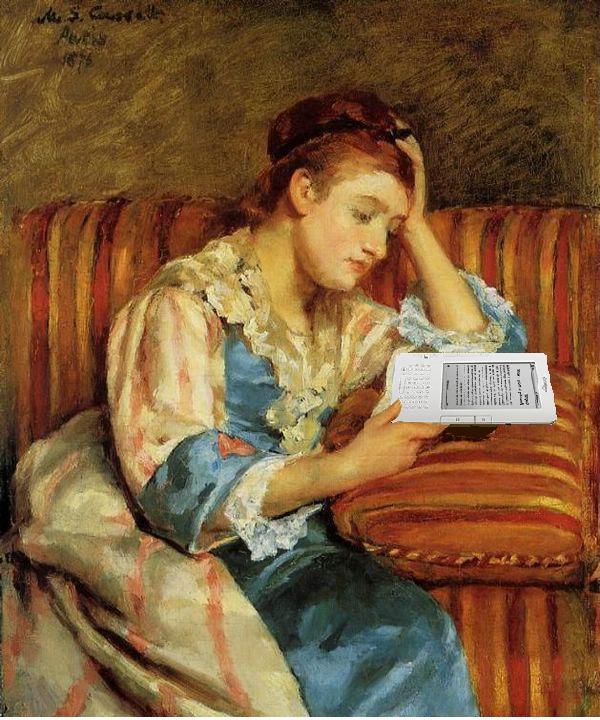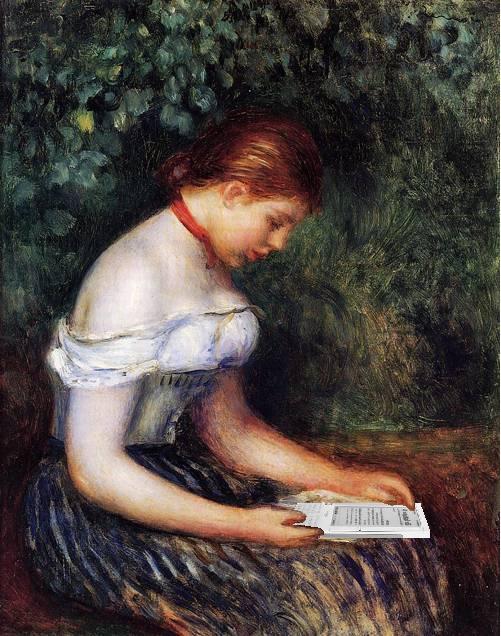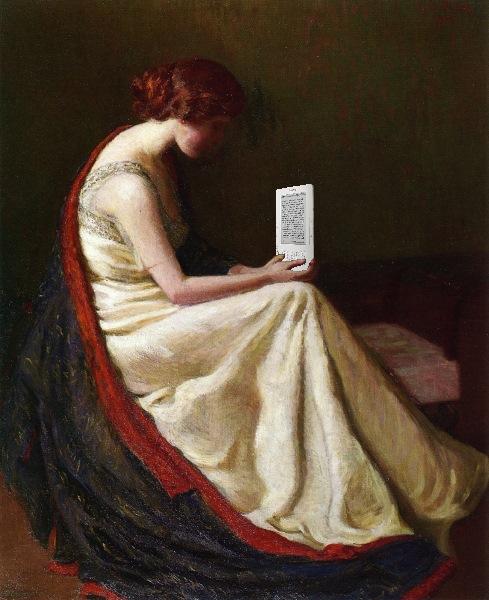TW Column by David Biddle
Kindles Aren't "Real" Books—but That's Not the Point
Last summer, I read Heart of Darkness on my cell phone. I read in line at the supermarket, sitting in my dentist’s waiting room, and even by sneaking peeks during traffic jams. Ten years ago, I would have gone to Borders to purchase the paperback or maybe to my local library. But this June, I downloaded it through Readmill, one of my favorite book sites. It took less than a minute. I didn’t spend a dime.
 E-books are knocking down walls like never before—for readers and authors. As a reader, I can carry a whole library in my hip pocket, using a variety of insanely small gadgets. As a freelance writer, digital books have opened up dozens of creative vistas and opportunities for me.
E-books are knocking down walls like never before—for readers and authors. As a reader, I can carry a whole library in my hip pocket, using a variety of insanely small gadgets. As a freelance writer, digital books have opened up dozens of creative vistas and opportunities for me.
Yet, market research over the past year indicates that most general readers still don’t get the digital reading thrill.
Last July, Rasmussen Reports released a study, based on a survey of a thousand adults, claiming that “[t]hree-out-of-four Americans still prefer a traditional book” to a digital edition on an e-book reader.
The press was quick to leap on this finding. “Kindle Fired,” read the Washington Examiner's headline. Rochester Business Journal conducted a survey of its own readers, noting that "[o]f the nearly 375 who said they rarely or never read e-books, 78 percent said they just prefer print."
Spurred by a 2012 Pew Research Center report that found similar reading preferences, Sacramento State University's State Hornet ran an opinion piece with quotes from students about why they prefer print. One English major referred to there being “something special” about buying a used book:
You buy it because it has that history and you can see who has handled it—what people have underlined themselves and what made it special for them.
Such criticisms, especially from younger readers, have caught me off guard. Three years ago, I first read an e-book on my wife's iPad—and loved it. Soon after, I received a Kindle for my birthday, followed by my own iPad. Now, though, I feel like the kid who goes out and buys all sorts of shiny new football gear and shows up at the field only to find that everyone else still just wants to play tag.
Am I advocating an end to print books? Of course not. This really isn’t an either/or game. If paper books stopped being published tomorrow, there would be plenty of used books for diehard paper fans to read for a couple thousand reincarnations.
But if you look beyond the bad headlines, it’s obvious electronic publishing is a juggernaut. If only for business reasons, e-books will be ubiquitous before the end of the decade. They’re far cheaper to produce and distribute than print books. The big publishers will eventually figure out that digital media provides dozens of new ways to promote themselves and other products while customers read their books.
It’s where we’re headed with e-books that matters. If you’re an indie writer or publisher of e-books, keep telling yourself that. Where we’re headed is what matters, and we’ll be there, waiting for everyone else to catch up. Where we’ve been—and even where we are right now—is old news.
I love print books, by the way. Text on a screen really isn't the same as a well-designed book with expensive paper and binding. For those of us who came of age before the advent of personal computers, the heft, scent, and feel of a book is deeply embedded in the reading experience. Adjusting to the fact that thousand-page e-tomes like Anna Karenina and Infinite Jest weigh the same as a short story by Alice Munro really is a psychological and emotional shift.
 I also have my own problems with e-books. Mainstream publishers spew out digital editions that are rife with typos and other distracting elements. It's impossible to flip through pages on an e-book or to navigate easily on a screen.
I also have my own problems with e-books. Mainstream publishers spew out digital editions that are rife with typos and other distracting elements. It's impossible to flip through pages on an e-book or to navigate easily on a screen.
But even if three-quarters of the general public say they’d prefer a traditional paper book, that doesn’t mean people won’t read an electronic one. Most classics, from the early 1900s on back, are available as e-books for free. Free!
And the joys of e-reading are not just a matter of convenience or business trends. Being able to change the type size is great, especially for us old farts. You can have your e-reader read a story out loud to you (albeit in a robotic computer voice). Many e-books are now available with multimedia components: music soundtracks, sound effects, enhanced graphics, video clips.
My cell phone is synched to my iPad, my Kindle Touch, and my MacBook. I can open up Heart of Darkness to the last page I was on and read seamlessly on all my gadgets. I have access to every e-book in my library from Tao Lin’s latest weird novel (Taipei) to George Saunders’s new story collection (Tenth of December).
For anxious indie writers like me, it also helps to look at the future of e-books from a classic marketing perspective. With every new technology—from phones and computers to hybrid cars and microwaves—consumer acceptance goes through the same basic cycle.
First come the innovators and early adopters, representing about a fifth of the market (my tribe!). That roughly matches the Rasmussen research numbers on e-books, where 15 percent of respondents said they preferred e-books over paper books. (Another 10 percent were undecided.)
After a few years, the main craze kicks in, when the majority of consumers go for a new device. Marketers often divide this majority into “pragmatic” and “conservative” groups, depending on how quickly they hop on a technology trend. Regardless, the majority represents a hefty 70 percent of the market.
In this model, a new technology needs to cross the gap between a niche market of innovators to that 70-percent majority of consumers who embrace it. Crossing this gap means the difference between success and failure for a new technology (think VHS vs. beta-max video).
We’re now just passing through that gap for e-books. As Nathan Bransford, one-time agent and author of the recently released How to Write a Novel, notes in his blog:
Let's stop philosophizing about how people just don't like e-books very much or only like them in certain contexts or for certain genres or all the people who will convert have already done so.
E-books have never been on pace to rout the print market all at once. It's always been a steady march, and it's one that's continuing.
 Yes, the Rasmussen numbers and other studies still show the majority of the reading public lagging behind. But, given the complexity, confusion, and irrationality of the digital media world, that’s to be expected. Until very recently, publishers and media companies have done a poor job of converting consumers to the virtues of digital literature. Readers have more often stumbled into the new world of e-books than followed a yellow brick road.
Yes, the Rasmussen numbers and other studies still show the majority of the reading public lagging behind. But, given the complexity, confusion, and irrationality of the digital media world, that’s to be expected. Until very recently, publishers and media companies have done a poor job of converting consumers to the virtues of digital literature. Readers have more often stumbled into the new world of e-books than followed a yellow brick road.
As for that last hardcore, 10-to-15 percent of consumers referred to as “laggards” (or Luddites) by market researchers, it may be years until they turn on an e-reader or peruse a book app on their iPad. Hell, they may never own an iPad. They may keep a few bookstores open in the more literary sections of the country. More power to them and to the bookstores.
But remember: I was reading Heart of Darkness on my cell phone. According to the International Telecommunication Union, there are almost 7 billion mobile phones in use worldwide. Two years ago, if you’d told me I would enjoy reading Joseph Conrad on my phone while waiting to buy groceries, I would've been insulted. Now, I not only read while doing the family shopping, I have a new icebreaker at parties:
“Have you ever read a book with your cell phone?”
Publishing Information
- “75% Prefer Traditional Book to Electronic Reading Device,” Rasmussen Reports, July 18, 2013.
- “Kindle Fired: 75% Want Printed Books, Not E-Books” by Paul Bedard, Washington Examiner, July 19, 2013.
- "Readers Favor Print Over E-Book Format,” Rochester Business Journal, July 26, 2013.
- “Paper Books Are Still Better than E-Books” by Shanel Royal, The State Hornet, May 15, 2013.
- “The Rise of E-Reading—Part 2: The General Reading Habits of Americans,” Pew Internet & American Life Project, Pew Research Center, April 4, 2012.
- “Reading Habits Statistics: Who Reads E-Books?” by Patricia de Hemricourt, Publishing a Book Is an Adventure, September 12, 2013.
- “What Is the Chasm and How Do You Cross It?,” Product Strategy, November 2, 2008.
- “Here Comes Another Round of Articles About E-Book Sales Slowing Down” by Nathan Bransford on his blog, August 12, 2013.
- “Mobile Subscriptions Near the 7 Million Mark: Does Almost Everyone Have a Cell Phone?,” ITU News (International Telecommunication Union), February 2013.
Art Information
- "Mrs. Duffee Seated on a Striped Sofa, Reading Her Kindle, After Mary Cassatt" © Mike Licht; Creative Commons license.
- "The Kindle Reader (A Young Girl Seated), After Renoir" © Mike Licht; Creative Commons license.
- "The Kindle Gazer, After Lilla Cabot Perry" © Mike Licht; Creative Commons license.
 David Biddle is TW’s “Talking Indie” columnist. He’s the author of the novel Beyond the Will of God and several collections of short stories. As a freelance writer, David has published articles and essays in Harvard Business Review, Philadelphia Inquirer, Huffington Post, Katori Magazine, and BioCycle.
David Biddle is TW’s “Talking Indie” columnist. He’s the author of the novel Beyond the Will of God and several collections of short stories. As a freelance writer, David has published articles and essays in Harvard Business Review, Philadelphia Inquirer, Huffington Post, Katori Magazine, and BioCycle.
He's currently working on a cycle of novels about sex, love, and married life near the edge of Philadelphia. For more information about what else he's mucking around with, see David Biddle’s website.
